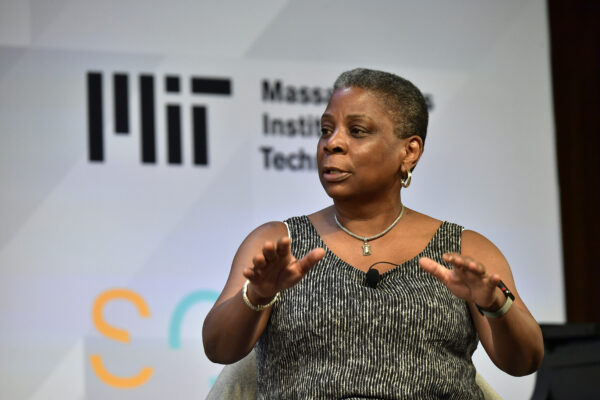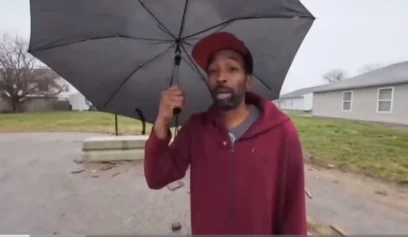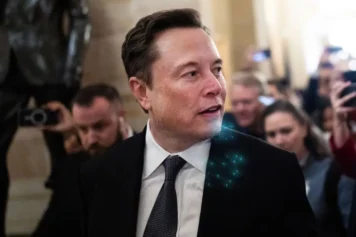Ursula Burns, who became the first Black female CEO of a Fortune 500 company, said she never bought into the narrative that women lift a heavier burden when balancing a career and a household. The history-maker believes she could not have achieved such a high level of success had she not “outsourced” the caring of her children with trusted members of her village.

During an interview with CNBC’s “Make It,” Burns, the former CEO for Xerox, said her late husband Lloyd Bean was instrumental in the caretaking of their two children, Melissa and Malcolm Bean, as she scaled the corporate ladder and after accepting the top executive position at the company in 2009.
Burns served in the C-Suite at Xerox from 2009 to 2016. When the company was divided into two corporate entities, Xerox and Conduent, she became the business’ chairman, staying in that role until 2017.
In her capacity as the top executive, she was also appointed by President Barack Obama to head up the White House National STEM program to promote STEM-related careers to students (2009) and later appointed as vice chair of the President’s Export Council (2015).
Simultaneously, Burns served on the boards of directors of other companies, including Uber, American Express, and ExxonMobil, leading Forbes magazine to name her as one of the top 25 most powerful women in the world.
With so many leadership roles, Burns and her husband worked out a system that worked for them. Bean retired early from his job as a research scientist at Xerox and Burns decided that she didn’t have to be, nor could she be, the supermom or a “helicopter mom.”
“I would not be able to be CEO of the company unless I outsourced the caring for my kids,” the 63-year-old said. “I was not a believer that you had to go to all your kids’ games. I just don’t understand what that’s all about.”
She said that many people judged her for not being at all of her children’s school programs and activities. Burns noted even when she would come, she didn’t lock in on every bit of the game but used the time to relax — even working on crossword puzzles as she sat in bleachers.
“I [wasn’t] a helicopter mom,” she says. “We did what we had to do.”
Jason Aten, a columnist for Inc., said there were people who were upset with not just her parenting choice, but also her use of words to describe their parenting philosophy.
“I think one reason the statement was controversial is that Burns talked about how she ‘outsourced’ caring for her kids,” he wrote. “We tend to think of outsourcing as something you do when you don’t have the bandwidth or expertise to do something. I don’t think that’s exactly what Burns means.”
Aten offered an alternative view of the word, saying, “I’m not sure that ‘outsourcing’ is the way most people would describe it, but just because they wouldn’t say it out loud doesn’t mean Burns is wrong.”
Burns revealed a part of the “outsourcing” was to enlist her sister, who lived nearby, to sometimes come and help with her kids. She insisted, “It takes a village, and we had the village.”
Aten believes people aren’t being honest with themselves because everyone relies on their village in one way or another.
“Everyone, to some extent, outsources the care of their kids,” he said. “We just don’t usually call it that.”
“Burns didn’t say she didn’t participate in raising her children, or that she didn’t care about them. She simply said that there were times when she had to choose between her career and being at individual events in the lives of her family. In those times, there were other people who stepped in to help,” he remarked.
WOLB Baltimore’s Shannon Dawson says that Burns’ statement while inspiring, doesn’t work for some women in America, especially Black women in 2022.
“The COVID-19 pandemic has presented Black moms with several unprecedented challenges,” she argued, making Burns’ reality very different from the average African American mother.
She noted how many Black working mothers were on the frontlines of the pandemic, working “as nurses, personal care aides, and in retail, struggling to provide for their children.” Dawson asked people to consider how many of them were laid off during the roughest parts of the pandemic, and the challenge it proposed to them finding viable childcare options.
Dawson added during the pandemic, “51 percent of Black women said that they had trouble paying for food and housing on top of taking care of their families in 2021.”
Dawson is correct. Work and parenting options for African-American women post-pandemic are very different from those available to Burns, who raised her children a decade ago, pre-pandemic.
For her household, Burns believes her family’s approach worked out well, saying that “village” raised two unbelievably good kids.”
But that does not mean that she has no regrets. Burns says that while much of her home life and work-life was thriving, her quick rise in her career ascent sometimes left her feeling detached from basic things in her day-to-day life, making her wish in that space she was more present.


